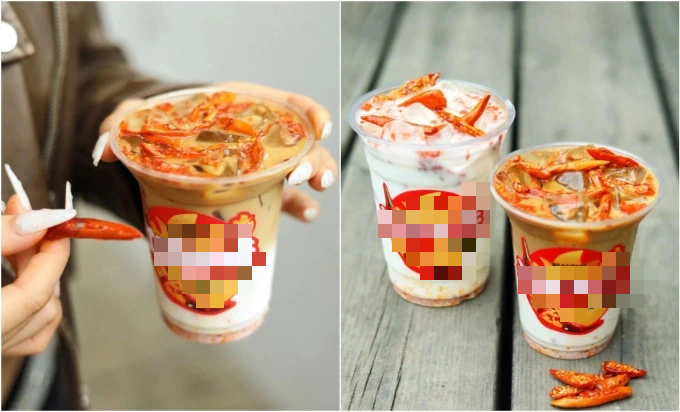In recent times, many popular international foods and drinks have quickly entered Vietnam and become trends, such as cheese coin cake (originating from South Korea), lemon tea with whipped cream, clay pot milk tea, and grilled frozen sausages (from China). However, the spicy coffee or hot latte, created by a coffee shop called Jingshi in Jiangxi province in December 2023 and quickly became popular in China, has yet to be introduced in Vietnam.
According to the owner of Jingshi coffee shop, this drink is a combination of traditional iced latte and dried chili pepper, chili powder to satisfy the locals’ craving for spicy flavors. The price for each cup of coffee is 20 yuan (equivalent to 68,000 VND).
The coffee shop revealed that many customers came to try this unique drink out of curiosity. On some days, they sell around 300 cups of spicy latte.
By the beginning of February 2024, this drink has been circulating on social media. However, many users in Vietnam believe that this beverage is unlikely to become a trend due to its contrast with Vietnamese taste buds. Currently, there are no coffee shops in Vietnam that dare to sell this product.

Spicy coffee
According to Mr. Hoang Tung, an expert in the F&B industry, not every product that is trendy in China can also attract Vietnamese customers.
For a product to become a trend, it must have qualities like good quality, good taste, and unique characteristics that excite consumers. For example, lemon tea with whipped cream has a unique and fragrant taste, or Mixue ice cream, grilled milk tea from Yunnan, salted coffee… are all easy to consume and have distinctive flavors.
Based on this, Mr. Tung believes that the spicy coffee lacks the elements to create a trend because it only has the unique factor and falls short on other aspects. If this drink were to appear in Vietnam, it would only tempt people to try it out of curiosity rather than having long-term appeal.
According to a café owner in Thu Duc city, the name “spicy coffee” is intriguing because of its uniqueness, but it does not match the Vietnamese palate at all.
“Just hearing about chili makes customers think of spicy flavors, combined with bitter and sweet milk coffee. If I were a customer, I wouldn’t dare to try this beverage,” said the café owner.












